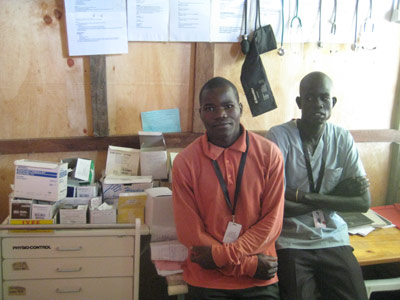(Daniel Crawford) This week we had about 150 patients every day in the clinic except for Friday. I was made to take Monday off from work to rest a little more from my recent illness, and Tuesday I returned to work. Jessica and I saw 15-25 wound patients each day. We have had a couple more colorful injuries recently. One woman has a few lacerations on her palm/fingers due to a fight involving a knife. Jessica and the twins sutured her and she comes in for cleaning daily. Another man sustained a pretty serious 2nd degree burn to his outside ankle, which I had the honor of “debris-ing” and cleaning (I got to scrub off the charred skin and blisters. very nasty. a bit of blood). Yesterday afternoon a woman came in very nonchalantly with a deep and wide 6-inch laceration on her foot from a puncture wound at a construction site. She was very good humored and funny. I like her a lot. There’s another man with partial amputation on two fingers who comes in for cleaning. And then we have lots of children with cuts and open wounds on their legs and feet.
I have found that the Sudanese people are wonderful patients (as far as wound cleaning is concerned). They don’t speak much of any English, so that they don’t complain. They don’t really understand or have a culture of medicine, so that can’t easily know when I’m doing something right or wrong. And they also have an unbelievable tolerance for pain (some exceptions to the younger generation, whose culture is changing much faster than their parents’ generation). They don’t cry. They limit their screams or don’t scream it all. It’s amazing.
However, there was on boy on Wednesday who needed a tetanus shot, who was afraid to the point of rebellion; he wouldn’t let us do it. He didn’t fight, but he insisted ‘no.’ So instead, I told him, “If I get the shot first, will you do it?” I asked him 2-3 times. His eyes were so sad. But I looked him in the eye, and he finally agreed. So Jessica gave me a shot with sterile water in the shoulder, and then I gave him his tetanus shot. Success. Sebit explained to me the week before that the culture has a large fear of spears and dying by them; some patients greatly fear needles for this reason. I don’t know what this boy saw or went through to make him so deathly afraid, but I’m glad he was able to overcome it.

